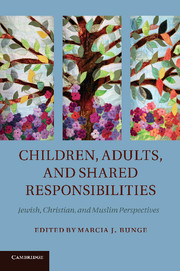Book contents
- Frontmatter
- Contents
- List of Contributors
- Acknowledgments
- Introduction
- PART I RELIGIOUS UNDERSTANDINGS OF CHILDREN
- PART II RESPONSIBILITIES OF CHILDREN AND ADULTS
- Chapter 9 Work, labor, and chores
- Chapter 10 Honor your father and your mother
- Chapter 11 Will I have Jewish grandchildren?
- Chapter 12 Linking past and present
- Chapter 13 Orphans and adoption
- Chapter 14 Second-hand children
- Chapter 15 Christianity's mixed contributions to children's rights
- Chapter 16 Children's rights in modern Islamic and international law
- Select bibliography
- Index of names
- Index of subjects
- References
Chapter 10 - Honor your father and your mother
A Christian perspective in dialogue with contemporary psychological theories
from PART II - RESPONSIBILITIES OF CHILDREN AND ADULTS
Published online by Cambridge University Press: 05 October 2012
- Frontmatter
- Contents
- List of Contributors
- Acknowledgments
- Introduction
- PART I RELIGIOUS UNDERSTANDINGS OF CHILDREN
- PART II RESPONSIBILITIES OF CHILDREN AND ADULTS
- Chapter 9 Work, labor, and chores
- Chapter 10 Honor your father and your mother
- Chapter 11 Will I have Jewish grandchildren?
- Chapter 12 Linking past and present
- Chapter 13 Orphans and adoption
- Chapter 14 Second-hand children
- Chapter 15 Christianity's mixed contributions to children's rights
- Chapter 16 Children's rights in modern Islamic and international law
- Select bibliography
- Index of names
- Index of subjects
- References
Summary
One of the most important duties of children is to honor their father and their mother. This ethical position is defended in many forms of Christianity, as well as in Judaism and Islam. Christians refer in this context to several scriptural passages. The two most commonly cited are: “Honor your father and your mother, so that your days may be long in the land that the lord your God is giving you” (Exodus 20:12); and “Honor your father and your mother, as the lord your God commanded you, so that your days may be long and that it may go well with you in the land that the lord your God is giving you” (Deuteronomy 5:16).
Although the commandment to honor one's father and mother seems rather obvious and straightforward at first, it raises many questions. What does it mean to honor? Is the commandment directed toward children or adults, or toward both? Should we think only of biological mothers and fathers in relation to this commandment? What does it mean to honor one's parents if one is a victim of incest? In what sense is parental care for the child a presupposition of the command to honor one's parents? Is honor tied to obedience?
This chapter addresses these and other questions about the meaning of “honoring parents.” It points out the dangers in a certain Catholic interpretation of this commandment. In the Catholic tradition, and in other Christian traditions, the commandment to honor one’s father and mother is often interpreted as a commandment to obey parents and others in authority. This interpretation is built on New Testament texts that tie closely together the commands to “obey” and to “honor.” Ephesians 6:1–3, for example, states: “Children, obey your parents in the Lord, for this is right. ‘Honor your father and mother’ – this is the first commandment with a promise: ‘so that it may be well with you and you may live long on the earth.’”
- Type
- Chapter
- Information
- Children, Adults, and Shared ResponsibilitiesJewish, Christian and Muslim Perspectives, pp. 187 - 201Publisher: Cambridge University PressPrint publication year: 2012

